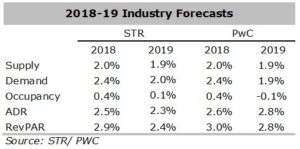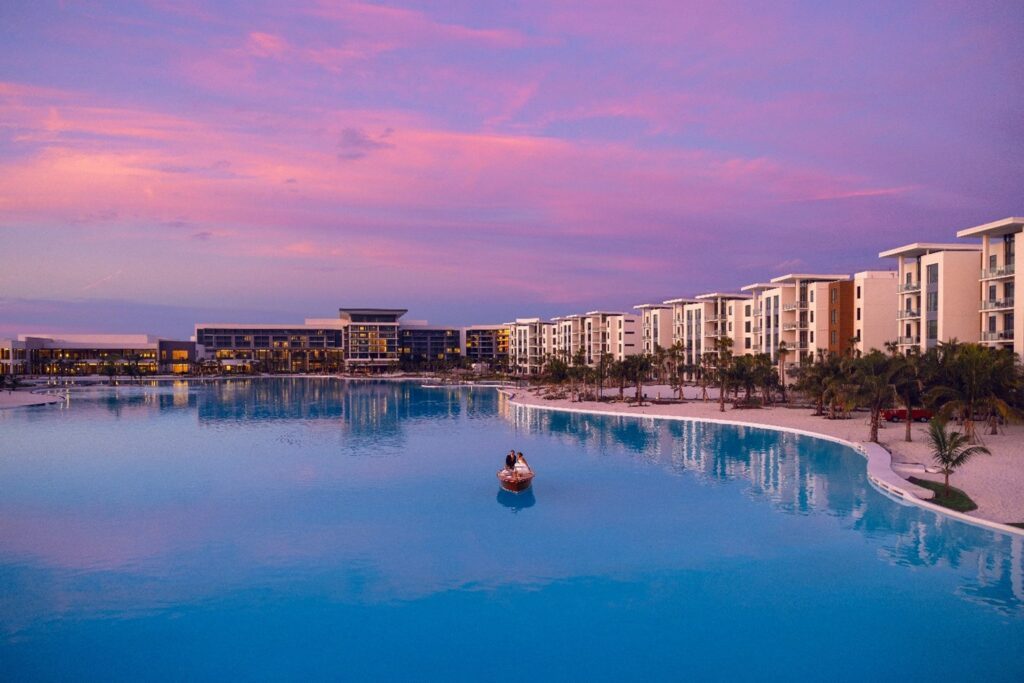The sentiment at the 2018 NYU Hotel Investment Conference was very positive for the industry with expectations of continued growth in the coming years. Among the wealth of relevant information from the conference, we identified several key takeaways that highlight the state of the industry in 2018 and beyond:
- Improved Performance: Occupancy and ADR will continue modest growth as expectations for 2018 and 2019 were revised upward by all the major data analysis firms. The following table indicates the revised forecast for the next two years.

Occupancy levels are projected to increase modestly to record levels. New supply will be absorbed and that will allow demand to grow.
- New Brands: Margaritaville announced its launch of its upscale, select-service, lifestyle brand, Compass. The Compass brand will target both resort and non-resort areas. Caesar’s Entertainment announced it will expand its non-gaming hotel offerings by licensing its Caesars Palace, Cromwell, Linq, and Flamingo brands. These brands will primarily be in resort and vacation destinations. These brands are all ‘lifestyle’ brands and not part of any of the major brand families.
- Airbnb: As with all recent conferences, Airbnb was a major discussion point. However, the concern of hoteliers shifted from the impact on their operational performance to the lack of regulations and taxing authority for Airbnb units. The major brands indicated that they experienced limited impact from these home stay programs. However, in the interest of a level playing field, the brands feel strongly that these home-sharing programs should pay taxes like other hotels and be subject to the same regulations.
- Resort Financing: A panel at the ‘resorts session’ discussed where financing can be obtained for new developments. Capital can be raised from high net worth individuals, capital funds, sovereign funds, and other relationships. Resorts typically cannot be financed through SBA financing as their loan and equity requirements are too great. The session highlighted the extra hurdles for resort developments in more rural markets as those locations are more seasonal and often surrounded by less infrastructure and complementary amenities. This can lead to even more challenges with financing, as the risks are higher. From our perspective, this session hit home on the importance of due diligence and proper feasibility analysis when considering resort development.
- Loyalty Programs: Several sessions discussed the benefits of loyalty programs by the various brands. Marriott announced they have 110 million members of their loyalty program, which is one of the largest hotel programs in the world. Hard Rock indicated that they receive 76% of their revenue from loyalty members. Loyalty programs typically allow for higher occupancies but may dampen ADRs and raise expenses. Many panelists stated the need for loyalty programs to focus on providing unique experiences instead of focusing solely on points to entice brand loyalty. In addition to fostering brand loyalty, these programs also seek to reduce guest booking through OTA’s by offering member-only rates and other incentives to direct booking.
Overall, the feel of NYU was positive, with attendees, panelists, and speakers all expecting and planning for continued growth for the industry. However, the industry is rapidly changing with technology and the sophistication of hotel and resorts guests. This means brands, developers, and investors need to continue to innovate and be aware these trends as the industry continues to grow into 2018 and beyond.
Authors
David J. Sangree, MAI, CPA, ISHC, is President of Hotel & Leisure Advisors (H&LA), a national hospitality consulting firm. H&LA specializes in appraisals, feasibility studies, impact analyses, economic impact studies, and litigation support for hotels, resorts, waterparks, casinos, conference and convention centers, golf courses, ski resorts and other leisure real estate. Our experienced consultants travel nationwide analyzing hospitality trends, studying leisure industries, and understanding local communities. We focus on our clients’ competitive markets and provide thorough and thoughtful analysis of hospitality properties. Our consultants have analyzed and prepared studies on more than 2,000 properties in more than 45 states, Canada, and the Caribbean. He can be reached via telephone at 216-810-5800 or via e-mail at dsangree@hladvisors.com.
John Burke is a Senior Associate at Hotel & Leisure Advisors and completes feasibility studies, appraisals, operational reviews, and other analyses for hotels, resorts, waterparks, RV parks, and other hospitality assets. During his career, he has analyzed a variety of hotel types in hundreds of markets throughout the United States. Prior to consulting, John led a team of revenue managers responsible for a portfolio of 150+ focused-service hotels. He earned a Bachelor of Science degree in Business Administration from the University of South Carolina with a major in accounting and a minor in hotel, restaurant, and tourism management. Contact him at (216) 228-7319 or jburke@hladvisors.com.


